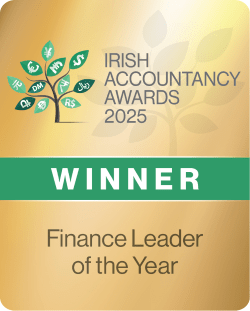Building a successful business in Ireland takes dedication, hard work, and a good dose of entrepreneurial spirit. But what happens when you’re ready to move on? Whether you’re looking to retire, pursue a new venture, or simply cash out, planning your exit strategy is very important. One key element to consider is Entrepreneurs Relief (ER), a valuable tax incentive offered by the Irish Revenue Commissioners.
In this guide we’ll explain everything you need to know about Entrepreneurs Relief. We’ll look at how it works, the eligibility criteria, and how it can significantly reduce your tax bill when selling your business assets.
Understanding Entrepreneurs Relief
Entrepreneur Relief is a tax incentive offered by the Irish government to reward qualifying business owners for their entrepreneurial efforts. It provides a significant reduction in capital gains tax (CGT) on the disposal of business assets or shares. Eligible entrepreneurs can benefit from a reduced CGT rate of 10% on qualifying gains up to a lifetime limit of €1 million, compared to the standard CGT rate of 33%. This tax relief aims to encourage entrepreneurship and investment in Irish businesses.
The Irish government introduced the relief to encourage entrepreneurship and investment in Irish businesses. By offering this tax incentive, the aim is to make it more attractive for individuals to start and grow businesses in Ireland, ultimately contributing to economic growth and job creation.
Eligibility Criteria For Entrepreneurs Relief In Ireland
To benefit, you must meet specific criteria set by the Irish Revenue Commissioners. Here are the key eligibility requirements:
1. Qualifying business asset disposals:
The relief applies to the disposal of qualifying business assets, which include:
- The whole or part of your business
- Shares in your personal company
- Assets used in your business or personal company
2. Ownership requirements:
- You must own at least 5% of the ordinary share capital of the company
- You must be a director or employee of the company, spending at least 50% of your working time in the service of the company
3. Time period conditions:
- You must have owned the business or shares for a continuous period of at least three years in the five years immediately preceding the disposal
4. Types of businesses that can benefit:
The relief is available to a wide range of businesses, including:
- E-commerce companies
- Marketing agencies
- Technology startups
- Professional services firms
However, the business must be a trading company or the holding company of a trading group. It’s important to note that these criteria can be complicated, and there are additional rules and exceptions. Consulting with a qualified tax advisor or accountant is crucial to make sure you meet all the requirements.
How Entrepreneurs Relief Works When Closing A Company
When you’re planning to close your company and want to take advantage of the relief, there are specific steps and considerations to keep in mind:
1. Process Of Company Closure And Relief Application
- Decide on the method of closure (e.g., members’ voluntary liquidation)
- Appoint a liquidator to manage the process
- Distribute the company’s assets to shareholders
- Apply for Entrepreneurs Relief on the capital gains from the distribution
2. Documentation Required
- Detailed records of your shareholding and involvement in the company
- Financial statements and tax returns for the relevant periods
- Documentation proving the company meets the trading requirement
- A valuation of the company’s assets
3. Common Pitfalls To Avoid
- Failing to meet the three-year ownership requirement
- Not maintaining proper documentation
- Misunderstanding the trading requirement for holding companies
- Overlooking the importance of timing in the liquidation process
- Owning a non-trading/investment entity within a group structure
Case Study
Let’s create an example. Sarah founded a successful e-commerce business in Galway ten years ago. As she prepared to retire, she decided to close her company through a members’ voluntary liquidation. By working closely with her accountant and tax advisor, Sarah made sure she met all the criteria for entrepreneurs relief:
- She had been a director and owned 100% of the shares for the entire ten-year period.
- The company was actively trading throughout its existence.
- She maintained detailed records of her involvement and the company’s financial history.
As a result, Sarah was able to apply for the Entrepreneurs Relief to the €900,000 gain from the liquidation distribution. Instead of paying the standard 33% CGT rate (which would have resulted in a tax bill of €297,000), she benefited from the reduced 10% rate, paying only €90,000 in CGT. This resulted in a tax saving of €207,000, allowing Sarah to retain more of the wealth she had built over the years.

Holding Company Relief
Holding Company Relief offers a significant tax advantage for business owners in Ireland who have structured their businesses using a holding company. This relief provides a complete exemption from capital gains tax (CGT) on the disposal of shares in a qualifying holding company.
Key Benefits
- Tax exemption: No capital gains tax on the disposal of holding company shares
- Potential for substantial tax savings: Holding Company Relief can significantly reduce your overall tax liability when selling your business.
Eligibility Requirements
- Trading requirement: The holding company must primarily own shares in trading companies. This means that at least 75% of the holding company’s assets must be related to trading activities.
- Ownership structure: The holding company must meet certain ownership requirements, such as owning at least 75% of the ordinary share capital of one or more trading companies.
Factors To Consider
- Timing: The timing of the disposal of holding company shares can impact the tax consequences. It’s important to consider factors such as the holding period of the shares and the overall tax position of the business owner.
- Other tax reliefs: Holding Company Relief can be used in conjunction with other tax reliefs, such as Entrepreneur Relief. However, it’s essential to carefully consider the interaction between these reliefs to ensure that you’re maximising your tax savings.
Using Holding Company Relief In Conjunction With Entrepreneur Relief
- Maximising tax savings: By structuring your business appropriately, you may be able to claim both Holding Company Relief and Entrepreneur Relief on the same transaction, potentially resulting in significant tax savings.
- Careful planning: It’s important to carefully plan your business structure and the timing of any disposals to ensure that you can effectively use both reliefs.
Consulting With A Tax Advisor
- Expert guidance: A qualified tax advisor can provide expert guidance on the suitability of Holding Company Relief for your business and help you navigate the complexities of the eligibility criteria.
- Tailored advice: A tax advisor can tailor their advice to your specific circumstances, ensuring that you’re taking full advantage of the available tax reliefs.
Holding Company Relief is more focused on the corporate structure of your business, while Entrepreneurs Relief is more focused on your individual role as an entrepreneur. Both reliefs can provide significant tax benefits, but it’s important to understand the specific requirements and choose the relief that best suits your circumstances. Consulting with a tax advisor can further help you maximise the potential benefits of this valuable tax relief.
Tips For Maximising Your Benefits
Planning for Entrepreneur Relief:
- Start Planning Early: The earlier you start planning for your exit strategy, the better prepared you’ll be to claim Entrepreneur Relief. This will give you time to get the paperwork you need and deal with any challenges that might come up. Remember you typically need to meet all qualifying conditions for three years before exiting to avail of Entrepreneur Relief.
- Maintain Proper Records: Keep detailed records of your involvement in the business, your ownership of the assets, and any changes in the company’s structure. This documentation will be important when claiming ER.
- Seek Professional Advice: Consulting with a tax advisor can help you manage the complexities of ER and make sure you’re maximising your potential benefits.
- Consider Holding Company Structures: Setting up a holding company can give you more ways to plan your taxes and could make you more eligible for ER.
Entrepreneur Relief can be a valuable tool if you’re looking to minimise your tax liability when selling your business assets. By understanding the eligibility criteria, planning ahead, and seeking professional advice, you can increase your chances of successfully claiming ER and maximising your financial gains.
Around Finance is here to assist you throughout the process. Our team of experienced accountants can provide expert guidance on Entrepreneur Relief, tax planning, and business exit strategies. Contact us today for a free consultation and let us help you achieve your financial goals.
FAQ
It can apply to disposals of shares in a holding company, provided the holding company is part of a trading group and at least 51% of its assets relate to trading activities.
Yes, you can claim relief multiple times, but the total qualifying gains are subject to the €1 million lifetime limit.
Yes, gains above the €1 million lifetime limit are subject to the standard Capital Gains Tax rate of 33%.
You must have owned the business or shares for a continuous period of at least three years in the five years immediately preceding the disposal.
Yes, you can claim entrepreneurs relief on a partial sale, provided it’s a distinct part of the business and meets all other qualifying criteria.
No, Entrepreneurs Relief is not automatic. You must actively claim it on your tax return and make sure you meet all the qualifying criteria.
Still got questions? Let us know what you’re looking for.











